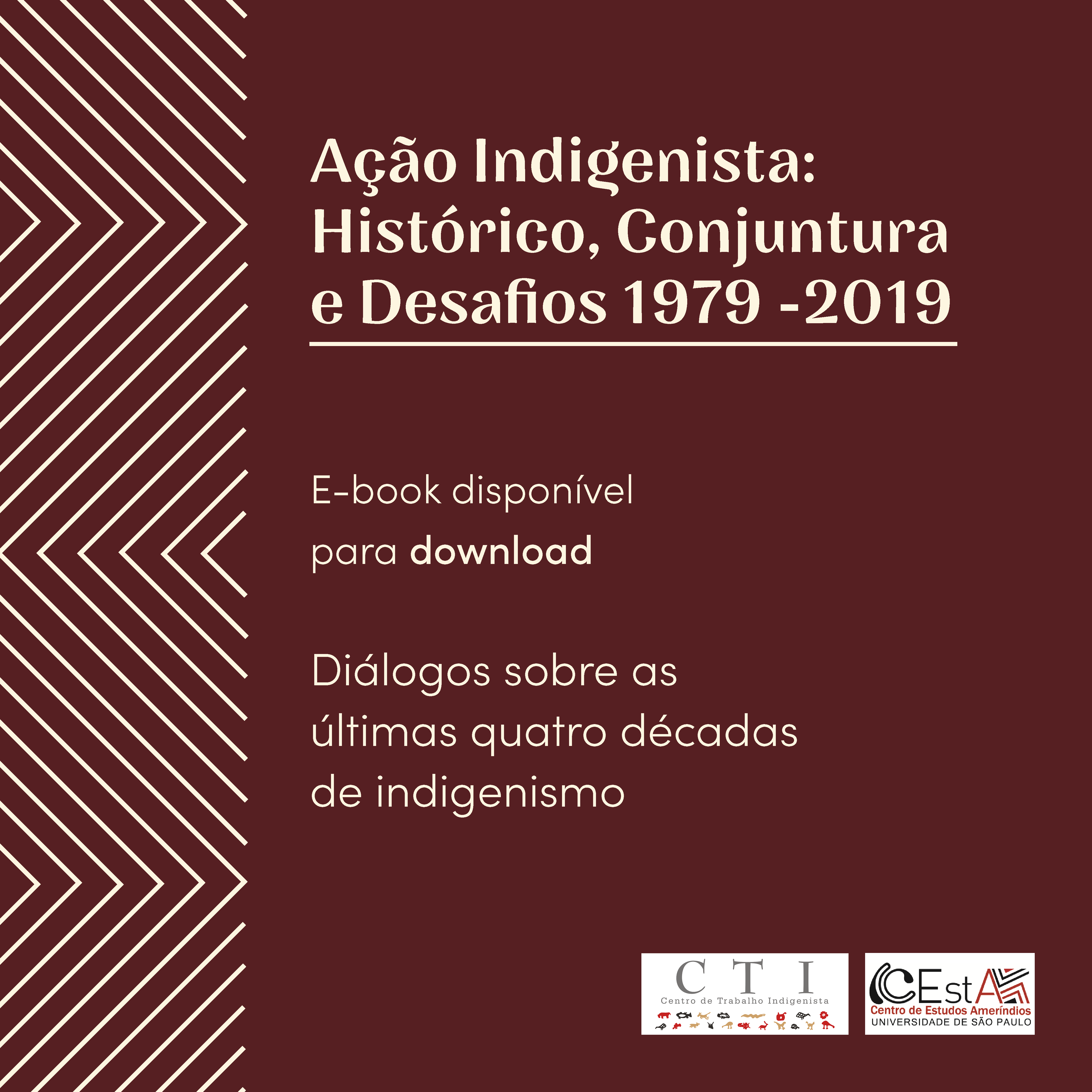The online version of the book Ação Indigenista: História, Conjuntura e Desafios 1979-2019 is available (access here). The result of the seminar that marked the 40 years of the Indigenous Work Center, the publication portrays aspects of the history of the CTI and of indigenism itself in the last four decades. In the book, the speeches of the participants of the debates of the event were transcribed in full.
It is possible to access the publication in the CTI Digital Library and in the page of the Center for Amerindian Studies (CestA) of the University of São Paulo, which jointly organized the publication.
The debates took place on March 28 and 29, 2019 during the seminar "Indigenous Action: history, situation and challenges", held in São Paulo, by CTI and CEstA, with support from the Laboratory of Image and Sound in Anthropology (LISA) of the USP, Amazon Cooperation Network (RCA), Educational Action and Royal Norwegian Embassy.
Given the richness and diversity of the twenty-eight presentations by indigenous leaders, anthropologists and indigenists, CTI and CEstA worked in partnership to make this material available in the form of an e-book.
“Writing part of the biography of an entity like the Centro de Trabalho Indigenista is also talking about the future: it is recording the history of the work of a group of young people, mostly anthropologists and anthropologists, who, in 1978, returned to field work in the villages. , decided to remain with the indigenous peoples who welcomed them, denouncing the colonialism practices imposed by FUNAI – everything, more than ever, so current – a group that at the same time built national and international partnerships that were and are strategic in the struggle for autonomy and self-determination of these peoples”, comments Marta Amoroso, anthropologist and researcher at CEstA-USP, in the book's preface.
In the publication, the reader will be able to get in touch with the discussions of the 40th anniversary of the CTI seminar. The debates were organized in order to reflect aspects of the history of creation of the CTI and indigenism in Brazil to some of the fundamental themes of the work in the current context. The contributions of the participants also bring perspectives for confronting the current political situation, seen as the most adverse for indigenous peoples and social movements since the times of the military dictatorship.
At the opening of the seminar, the conversations revealed aspects of the origin of CTI and the perspectives of its founders and former collaborators regarding the role of the institution and its performance.
"After 40 years of the CTI, and 30 years after the promulgation of the Federal Constitution (CF) of 1988, the new indigenists and the indigenous people and their leaders are making a supreme effort not to dismantle what has been minimally assured and achieved in these 30 years term of the Constitution. I mean, what our generation struggled to see uplifted, the younger generations, the new generations, are struggling not to see everything fall to the ground”, says, in this first dialogue, Maria Inês Ladeira, anthropologist, co-founder of CTI and current member of the institution's Advisory Board.
The discussion on territorial rights rescues historical aspects of the elaboration process of the 1988 Constitution, dilemmas and contradictions of public policies for territorial protection, the importance of demarcating indigenous lands in Brazil and the concrete local and regional struggles of indigenous peoples for land regularization of their territories and confronting violence.
“When the Federal Constitution of 1988 was created, they gave the deadline for the government to demarcate all Indigenous Lands in Brazil within a period of 5 years, which did not happen. More or less, the Federal Constitution is 30 years old since it was created and gave 2 articles that guarantee our rights, and it wasn't because Brazilian society likes Indians and it gave these two articles, no. It was the struggle of the indigenous peoples”, recalls Jonas Pynheh Gavião, a member of the Wyty Catë Association of the Timbira Communities of Maranhão and Tocantins, in an excerpt of his speech.
Next, the debate on the challenges related to territorial management and sustainability in indigenous territories comments on consolidated experiences of Amazonian and non-Amazonian cases, bringing a wide range of initiatives.
“The PNGATI (National Policy for Territorial and Environmental Management of Indigenous Lands) is now practically shelved, without any kind of initiative on the part of this government for its implementation”, comments Jaime Siqueira, anthropologist and current Executive Coordinator of the CTI.
Finally, the book ends with a dialogue on aspects of indigenism from the dictatorship to the present day, recalling important historical events and seeking to project some scenarios for the future, already taking into account the challenges imposed by the first actions of the federal government that, in 2019 , still installed itself.
“For the context of the Amazon, for the Indigenous Lands, the dictatorship has not even ended in some regions, it is still there, hidden, camouflaged. Many things happen that are not leads.


